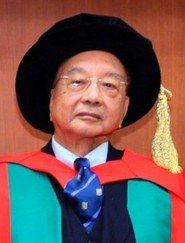

The lives of Dr Mok Hing Yiu and his ancestors would make a wonderful film. They provide a fascinating story of Hong Kong as it developed and prospered from its earliest founding to the present day. The story is one of entrepreneurs, professionals and philanthropists with a passion for society. They also reveal a link with this University going back almost a century.
Dr Mok was born in 1923 and is the great-grandson of Mr Mok See Yeng, who was the first comprador of the British firm Butterfield and Swire. Laying the basis for a family tradition, his great grandfather involved himself in philanthropic work and served in 1872 as the first Chairman of the Tung Wah Hospital which, at the time, was the only charitable institution in Hong Kong. The post of comprador passed from father to son and then to grandson. That grandson, Dr Mok's father Mr Mok Kon Sang, was a generous benefactor of this University and in 1921 donated to the University the sum of $50000, which at the time was an enormous sum of money. He was appointed a life member of the Court and established four scholarships named after him which still exist today.
Dr Mok tells me that his childhood was uneventful. At an early age he attended an old style Chinese private school until 1933 when he entered St Stephen's College in Stanley. He graduated in 1939 as Dux (Head Boy) of the College.
In 1939, at the unusually young age of 16, he entered the Medical Faculty of the University of Hong Kong as a King Edward VII Scholar. King Edward VII Scholarships were awarded annually to the top matriculating student and this was a great honour. Indeed you can see Dr Mok's name recording the award in gold lettering on the left just inside the main entrance as you walk out. The scholarship provided an annual allowance of £40 sterling which, he informs me, was a generous sum in those days, as a steak in St John's Hall dining room would only set him back about 15 cents! His medical studies, which were interrupted by the outbreak of the Second World War, were, thanks to the good offices of Professor Gordon King, continued in Free China to completion. In 1946 he returned to Hong Kong, joined Queen Mary Hospital and received a wartime MBBS in 1947. He was subsequently awarded the Hong Kong Defence Medal and the Auxiliary Medical Service Medal for his wartime service.
After further postgraduate medical studies and clinical work in the United Kingdom, Dr Mok returned to Hong Kong and served in the Government's Medical and Health Department as Acting Medical Specialist. There was a chronic shortage of doctors at the time and Dr Mok had to serve simultaneously in several posts: as Consultant Physician at Queen Mary Hospital, Consultant Physician in Kowloon Hospital, Medical Officer in charge of Lai Chi Kok Hospital (now Princess Margaret Hospital), Honorary Lecturer in Medicine at the University of Hong Kong (1951-1952) and Chief Editor of the Medical Journal of the Hong Kong Chinese Medical Association. This must have been a very demanding lifestyle and he tells me that he only survived by working very long hours!
He commenced his own practice in 1953 while continuing as a consultant to various hospitals. After a very energetic and eminently successful career, he finally hung up his stethoscope at the age of seventy and retired from practice.
Dr Mok is very proud of his family. He and his wife Rita (whom he met as a nurse at Queen Mary Hospital in 1946) have five children, who have blessed them with thirteen grand children.
Following the family tradition, Dr Mok has given considerable support to various organisations and charities especially in the fields of education, religion, youth and old people. More specifically, he and his wife, who are devoted Christians, have established an old persons' home in Shatin (named after Mrs Mok Wong Fung Yee). They also donated a large sum of money for equipping the newly built St Mary's Church Mok Hing Yiu College whose mission is to witness God's love and serve people through Christianity. The College seeks to provide whole person education laying equal emphasis on academic and moral development and aims to instil a lifelong learning capacity for self learning, critical thinking, discovery, creativity and adaptation to change; high ideals for which Dr Mok serves as an admirable role model. Dr Mok and his wife have also donated money for the establishment of a Mok Hing Yiu Library in a Bible College in Cambodia.
Dr Mok has also contributed significantly to his alma mater. He was an Honorary Lecturer in Medicine at this University and served as Vice-President and later President of the HKU Alumni Association. More recently in 2007 he generously endowed the Mok Hing Yiu Professorship of Respiratory Medicine and in 2008 established the Mok Hing Yiu Distinguished Visiting Professorships. He has made the same generous gesture to the Chinese University of Hong Kong.
Dr Mok is a Fellow of the Royal College of Physicians in Edinburgh, the Hong Kong College of Physicians and the Hong Kong Academy of Medicine.
Dr Mok's inspiration for devoting himself to service to the community emanates, he tells me, from his gratitude to God for providing him and his wife with a happy and successful life. He is rightly proud of his ancestors' service to the community of Hong Kong and I have no doubt that they would share with us immense pride and gratitude for Dr Mok's outstanding contribution to the betterment of our community.
Mr Pro-Chancellor, it is my honour and privilege to present Dr Mok Hing Yiu for the award of Doctor of Social Sciences honoris causa.
Citation written and delivered by Professor Michael Wilkinson, the Public Orator.



